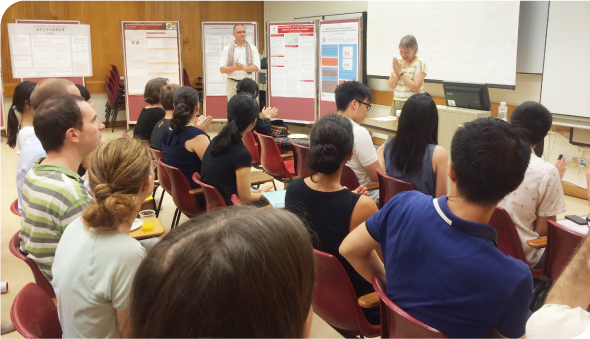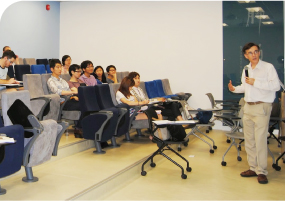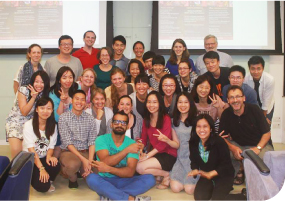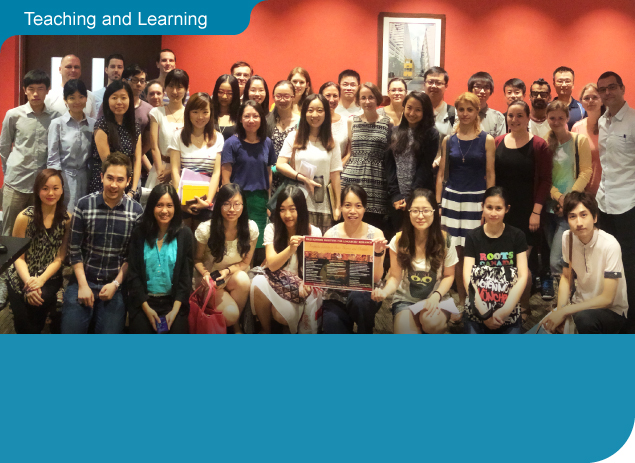The Linguistics Department sought to enhance the overall student experience this summer – and to contribute to the linguistic community in Hong Kong in general – when they hosted the Summer Institute for Linguistic Research, the first of its kind in Hong Kong. The Institute grew out of an idea by Dr Umberto Ansaldo who wanted to bridge the three-month summer hiatus and foster a community feel between students and faculty outside of formal interactions.
The Institute was organised by the Department of Linguistics’s Dr Cathryn Donohue, Professor Diana Archangeli and Dr Michelle Li. Dr Donohue, who also set up and maintained the website, said that as a huge organisational endeavour it was also a great opportunity to work closely with our research postgraduates. “Many of the students were offered tuition waivers in return for volunteering with some of the tasks involved,” said Dr Donohue, “Our research postgraduates took the lead on organising receptions, planned social activities and took responsibility for many other tasks, as well as generally acted as goodwill ambassadors to the visitors who came from around the world, including Southeast Asia, the United States, the United Kingdom and Australia, in addition to Hong Kong and the Mainland.”
The first week of the Institute was made up of a selection of five seminars each of which met for five 90-minute sessions. Guest lecturer Professor Mark Donohue, from the Australian National University – who is Dr Donohue’s brother – was invited to present on ‘Language History and the Pacific World’.
 Postgraduate students took part in a poster conference, with Professor Mark Donohue as the keynote speaker, to showcase their research and get feedback from other participants and faculty.
Postgraduate students took part in a poster conference, with Professor Mark Donohue as the keynote speaker, to showcase their research and get feedback from other participants and faculty.
The wide range of topics were very interesting. So many new ideas were presented, representing fascinating shifts in directions in the different sub-fields – it was really stimulating, albeit exhausting!
Dr Cathryn DonohueIntegrative approach
“It was an eye-opener,” she said. “The inclusion of a wide variety of data, beyond that normally used by historical linguists, has allowed us to refine our ideas of linguistic history. He’s tied the results of this integrative approach in with work he’s doing with archaeologists, botanists and geneticists, tracing the social and linguistic histories more thoroughly by bringing in new elements such as tracking pottery developments, food crop cultivation, to infer a clearer picture of social interaction (and thus linguistic history).”
Members of the Linguistics Department presented the four other seminars. Speaking on ‘Complexity in Language’, Dr Ansaldo examined issues of linguistic simplicity and complexity in a range of sub-disciplines. The ‘Emergent Phonology’ seminar by Professor Archangeli examined a range of cross-linguistic data to showcase a new approach to phonology that explores how grammars may emerge rather than be hard-wired.
Professor Tan Lihai’s class on ‘Brain Mechanisms of Language’, explored pioneering work in neurolinguistics, while Professor Stephen Matthews looked at ‘Typology and Transfer in Bilingual Acquisition’, investigating how a bilingual child’s developing language systems interact.
“The wide range of topics were very interesting,” said Dr Donohue. “So many new ideas were presented, representing fascinating shifts in directions in the different sub-fields – it was really stimulating, albeit exhausting!”
The second week comprised workshops on Linguistic Documentation led by Visiting Professor Peter Austin of the School of Oriental and African Studies, Mr David Nathan of the Oxford University, and Professors Honoré Watanabe and Toshihide Nakayama, both from the Tokyo University of Foreign Studies.
“In the Department we have students and faculty working on the description of a language – but not documentation, so it was extremely useful,” said Dr Donohue. “It was very hands-on, teaching us how to use professional audio equipment in a range of settings to produce archival quality recordings – and, crucially, what common problems to avoid.
Useful resource
“The workshop also covered principles and practice of language documentation, ethical issues, and stressed the importance of metadata – knowing who is in the room, where they are sitting, what they are doing, and how they’re connected – incorporating social and cultural factors so you can produce not just a report of specific linguistic phenomenon, but a complete picture to be archived as a useful resource to others in a range of disciplines.”
On the middle weekend, postgraduate students were invited to take part in a poster conference, an opportunity for them to showcase their research and get feedback from other institute participants and faculty. “We asked them to present by poster as it‘s less stressful than giving a talk,” said Dr Donohue, “but it also ensures that they have thought their ideas through and present a complete picture, making the feedback and exchanges more meaningful.”
Plans are already underway for the next institute. “One thing we learned this year is that despite a fairly thorough application process, participants didn’t all have same background, so we are considering offering refresher courses immediately prior to the seminars of the next institute,” she said. “We are exploring the possibility that our research postgraduate students be involved in teaching these courses. We would also like to offer more scholarships and would like to continue to bring in faculty from outside HKU to complement our expertise and are actively seeking funding to make the next institute even more successful.“ ■
 Professor Stephen Matthews’s class on ‘Typology and Transfer in Bilingual Acquisition’.
Professor Stephen Matthews’s class on ‘Typology and Transfer in Bilingual Acquisition’.
 A great variety of participants from around the world joined the week-long Linguistic Documentation workshop.
A great variety of participants from around the world joined the week-long Linguistic Documentation workshop.


